Contents
- Climate features in the Urals
- The best varieties of remontant raspberries for the Urals
- Varieties of large-fruited raspberries for the Urals
- Sweet raspberry varieties for the Urals
- Early raspberry varieties for the Urals
- Medium-ripening varieties
- Late varieties
- Conclusion
- Reviews about raspberry varieties for the Urals
The best varieties of remontant raspberries for the Urals are represented by early and mid-ripening varieties. Before buying a plant for your site, you need to study the existing selection and characteristics of shrubs.
Climate features in the Urals
When choosing raspberries for the Urals, it is necessary to focus on the climatic features of the region. Characteristic for him are:
- long and cold winters with temperatures dropping to -45 °C;
- late spring, coming no earlier than April, with return frosts until mid-June;
- hot and often dry summers;
- early autumn with a decrease in night temperature to negative values already in October.
Frost-resistant, hardy varieties with good immunity to diseases and pests are best suited for growing in the Urals. It is desirable that raspberries have strong shoots and powerful roots that penetrate deep enough into the soil. In terms of ripening, it is worth giving preference to early and mid-season varieties.
The best varieties of remontant raspberries for the Urals
Remontant varieties are optimal for growing in the Urals. Such raspberries begin to ripen in mid-summer and bear fruit in waves until autumn. In one season, a good harvest can be harvested from several bushes.
A shelf
Raspberries with medium early ripening bear fruit from late July to early September. Gives large pink-red berries up to 5 g each. The fruits are collected in small brushes, characterized by a pleasant sweet aroma, juiciness and bright taste. The variety is suitable for fresh consumption and for making jam.
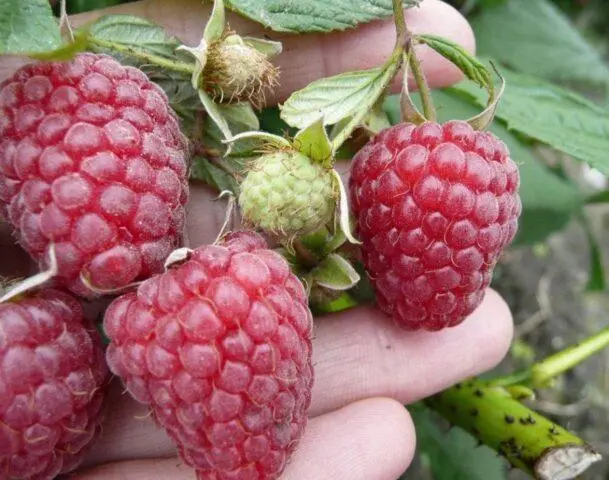
From one raspberry bush Polk in the Urals, you can harvest up to 7 kg of crop
Caramel
Remontant raspberries bring large juicy berries up to 6 g with a sweet taste. It gives up to 5 kg of fruits from one plant, you can start harvesting in the Urals in early August. The shape of the berries are wide-conical, red and shiny. After ripening, they are easily separated from the shoots, but do not crumble to the ground.
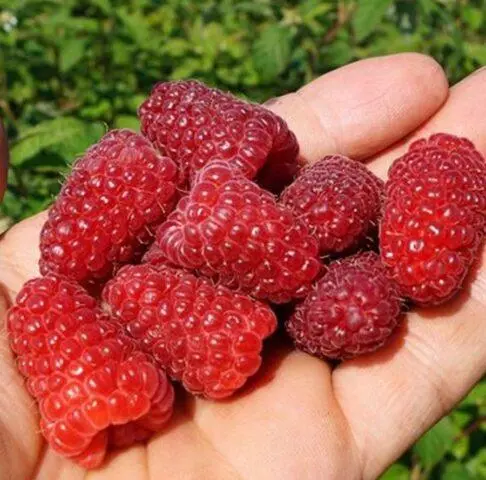
Raspberry Caramel tastes like forest
The Orange Miracle
Yellow-orange remontant raspberry brings medium-sized berries up to 6 g. It is distinguished by compact size and friendly ripening, the fruits are elongated, with a rounded tip, with good density. The taste of raspberries is sweet and sour, sugar content increases in proportion to the number of sunny days.
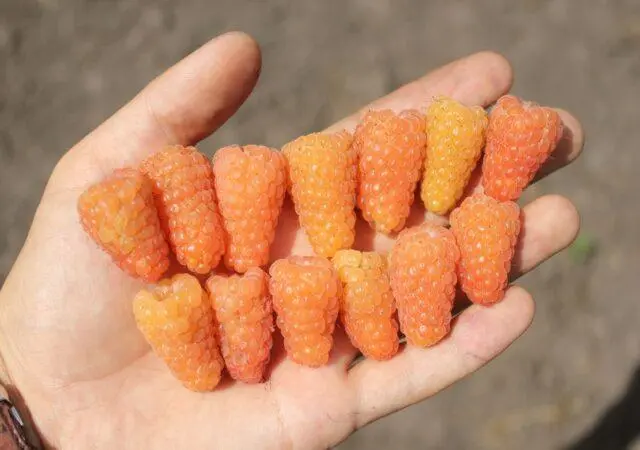
Raspberry Orange miracle tolerates transportation well and does not wrinkle
Varieties of large-fruited raspberries for the Urals
Large-fruited raspberries are distinguished by their special juiciness, softness and richness of taste. Several varieties are well suited for the Urals, as they are characterized not only by productivity, but also by increased frost resistance.
Penguin
Variety Penguin produces large round-conical berries with red-pink bright skin and pulp. On average, the fruits weigh 5-6 g, but can reach a larger mass. The taste of raspberries is sour-sweet, there are small bones in the pulp, but they usually do not interfere with consumption. The variety has a long shelf life both fresh and frozen.
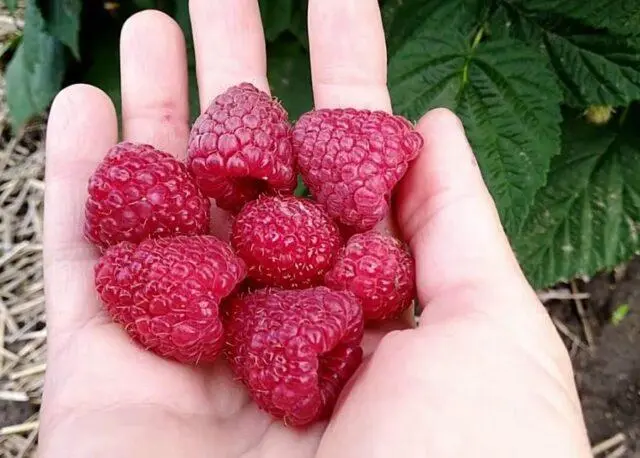
Raspberry Penguin in the Urals gives up to 6 kg of yield per bush
Eurasia
A hardy and frost-resistant variety is especially recommended for the Urals. It has a small size, stretches up to a maximum of 1,5 m, so the shrub is easy to cover for the winter. Fruiting of raspberries begins in August, conical berries reach a weight of about 5 g. The color of the drupe is dark red, with a matte skin, sour-sweet in taste with a moderate aroma. The yield of raspberry Eurasia is average – an adult bush brings about 3 kg of fruit.
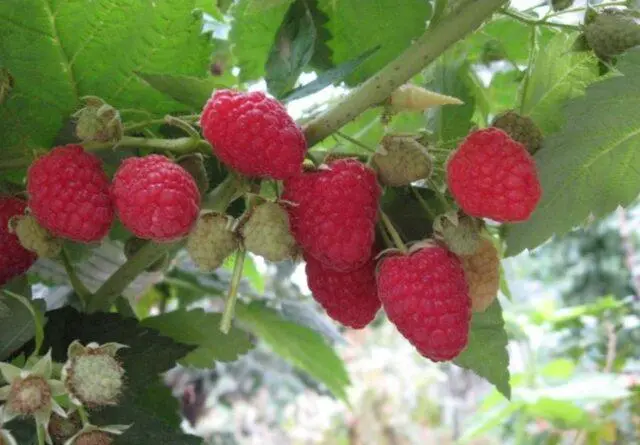
Raspberry Eurasia has thorns, but they are concentrated at the base of the shoots
Golden autumn
Golden-orange large-fruited raspberries with berries up to 7 g bring about 3 kg of drupes from one bush. It has a good sweet taste with a slight sourness; it is possible to grow a variety in the Urals not only for personal use, but also for sale. The shape of the berries is conical, slightly elongated, with slight pubescence. They stay on the branches for a long time after ripening and do not crumble, they retain their density when harvested.
The fruiting of the Golden Autumn variety in the Urals begins at the end of June and lasts until late autumn. Raspberries tolerate cold snaps well, but at temperatures below -30 ° C, they require high-quality shelter.
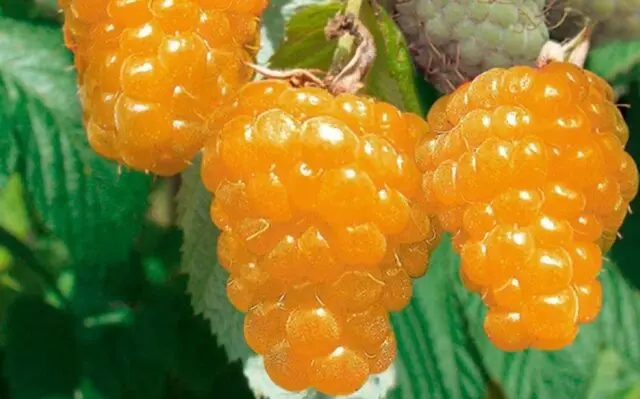
Raspberry Golden Autumn grows on average up to 1,6 m
Sweet raspberry varieties for the Urals
Raspberries with sour notes have refreshing qualities, but sweet varieties are most popular. They are especially good for fresh consumption.
Early sweet
Frost-resistant raspberries for the Urals bring dense berries of about 2 g by weight with a pronounced honey taste and rich aroma. The yield is quite good, up to 4 kg of fruit can be obtained from a bush.
Raspberries grow up to 2,5 m, so certain difficulties may arise with its shelter for the winter. The advantage of the variety is a small number of offspring. There are thorns on the shoots of the shrub, but they are few and thin enough.
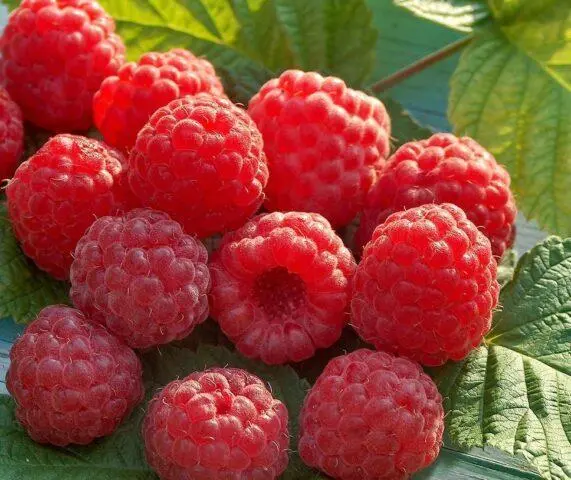
Raspberry Early sweet ripens in the middle of summer
Polana
Frost-resistant raspberries begin fruiting from mid-July and produce berries until early October. The average yield is about 5 kg per bush. The taste of drupes is pronounced sweet, the aroma is rich and floral. You can grow a variety in the shade – unlike many other varieties, Polan’s raspberry does not require a lot of sunlight.
The shrub grows up to 2 m, actively forms shoots and is spreading. Thorns on the branches are present, but in small numbers.

Raspberry Polana develops best on slightly loamy soils.
Bell
Drought-resistant and hardy raspberries produce small, sweet berries without bitter or sour notes. The fruits are conical in shape, with sparse pubescence, of a standard red color. The yield indicator is 3-6 kg per bush with good care.
In height, raspberry Bellflower reaches 2,5 m, the shoots of the plant are dense. It is distinguished by a developed root system that goes up to 40 cm underground, calmly tolerates severe frosts and a short-term moisture deficit.
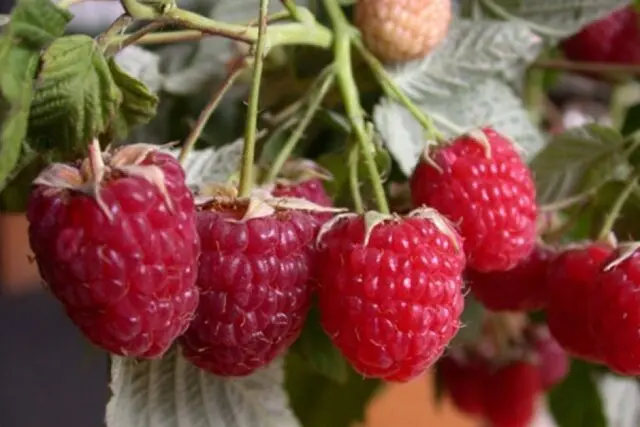
Raspberries bellflower reach 5 g by weight
Early raspberry varieties for the Urals
Early varieties are considered the best for growing in the Urals, since raspberries in this case are guaranteed to ripen before the onset of cold weather. Several varieties are in particular demand among gardeners.
Vera
Low raspberries bring up to 4 kg of fruit per bush, the berries are distinguished by good density and pleasant taste. You can harvest several times per season. For the first time, the fruits ripen in early July, the shape of the berries is round-conical, purple, the average weight is 2,7 g.
The disadvantages include the unsatisfactory density of drupes, due to which raspberries are poorly suited for transportation and long-term storage. At the same time, the variety is distinguished by its unpretentiousness, it tolerates frosts down to -25 ° C without shelter.
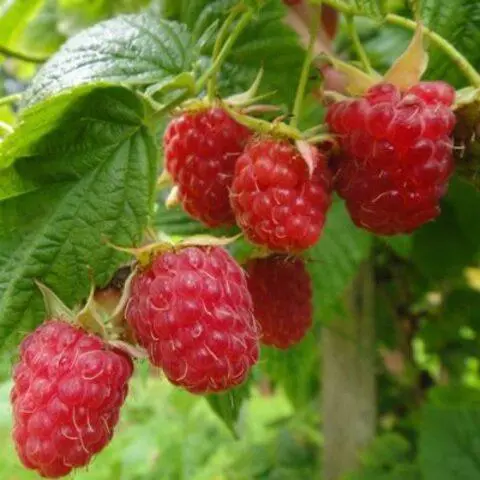
Raspberry Vera reaches 1,8 m above ground level
Brilliant
Winter-hardy raspberries can withstand temperatures down to -45 ° C. It grows on average up to 1,5 m, has flexible shoots with thorns at the bottom. Brings berries of 2,5-5 g of dark ruby color with dense pulp. Excellent for the Urals and Siberia, does not crumble from the bush for a long time, suitable for transportation. Harvest can be harvested in August, raspberries are sweet and sour, with a delicate aroma.
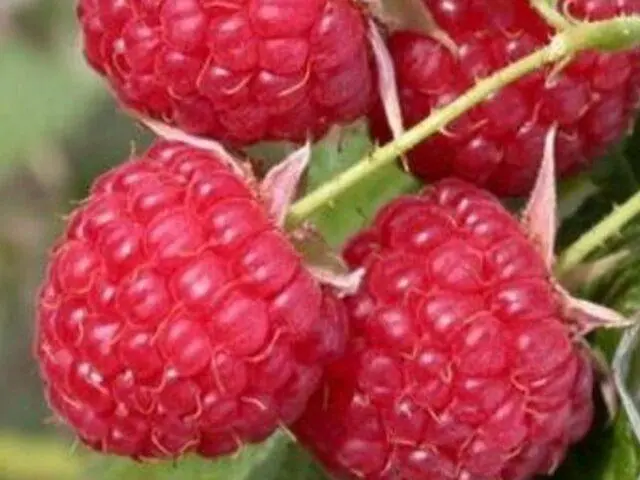
Raspberry Brilliant rarely suffers from fungi and pests
Patricia
High-yielding raspberry grows up to 1,9 m and has straight, slightly spreading shoots. There are practically no thorns on the branches. The berries are rich red, cone-shaped, up to 13 g by weight, with a velvety matte skin. The taste of raspberries is sweet, with a pleasant aroma, the seeds in the pulp are small.
The variety has good frost resistance and does not freeze out in the Urals in winter with minimal shelter. Rarely suffers from fungi, does not require complex care.
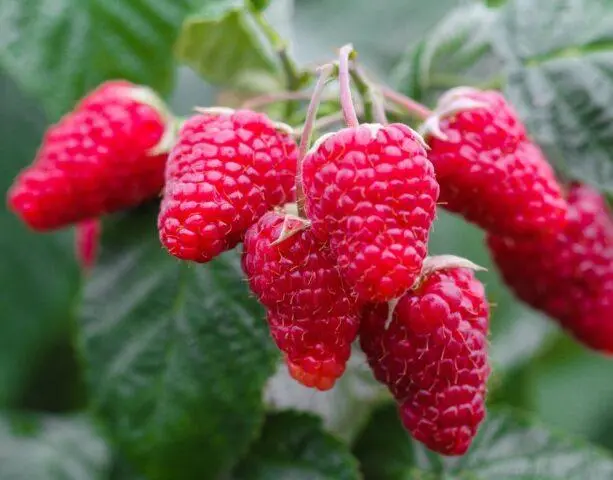
From one bush of raspberry Patricia you can get up to 8 kg of crop
Medium-ripening varieties
For cultivation in the Urals, varieties that ripen in the middle are suitable. Raspberries have time to get enough sunlight and acquire a good sugar content. At the same time, by the onset of autumn, the shrub naturally goes into a state of rest and does not suffer from cold weather.
Velvet
Raspberries have good keeping quality and are suitable for transportation. The bushes are medium in size, semi-spreading, with soft spikes on flexible shoots. Raspberries are officially recommended for cultivation in the Urals and Western Siberia, they calmly tolerate a drop in temperature to -35 ° C.
The berries of the variety are conical, red, with a sweet taste, up to 3 g by weight. The fruits are dense, do not crumble and do not rot after ripening.
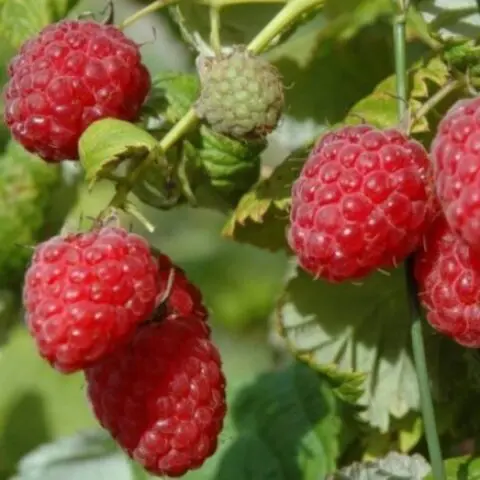
Raspberry Velvet is especially resistant to gray rot
Tourmaline
Large-fruited variety Tourmaline produces large pink-red berries with good density. It has a sweet and sour taste, usually ripens by the end of July or the beginning of August. The mass of individual berries is about 5 g, and up to 3 kg of juicy drupes can be collected from a bush.
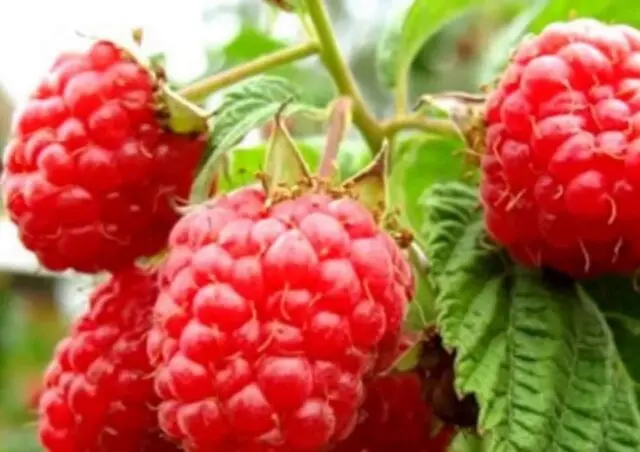
Raspberry Tourmaline is resistant to pests but can suffer from purple spotting.
Gift of Siberia
Raspberry Gift of Siberia brings soft cream-colored sweet fruits with a pleasant aroma. Recommended for the Urals and the Far East, grows up to 2,8 m, practically does not form root shoots. The berries of the variety are small, up to 2 g by weight. Do not crumble after ripening, the purpose of the fruit is dessert.
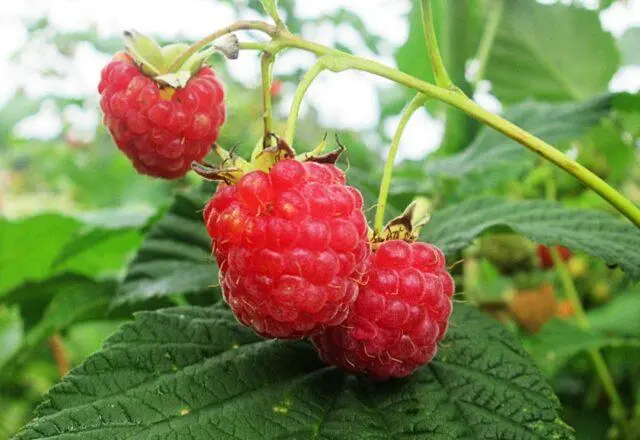
You can harvest raspberries Dar Sibiri at 4,5 kg per bush from the beginning of August
Late varieties
For the Urals, late raspberry varieties are worse than early and middle ones. However, some varieties can still be grown in harsh climates, although yields can then be unstable.
August miracle
The remontant raspberry variety brings large berries up to 8 g from mid-August until the first frost. The fruits are sweet, juicy, universal, suitable for subsequent sale. Under favorable conditions in the Urals, one raspberry bush can bring up to 5 kg of berries.
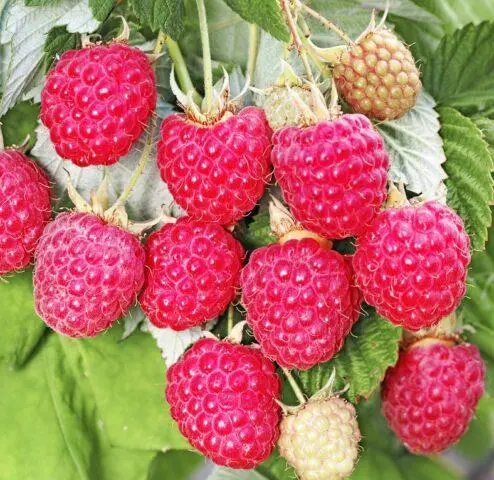
Raspberry August miracle requires a garter to the trellis
Diamond
The raspberry variety brings a crop from the end of summer until the first frosts, gives red berries slightly pointed at the bottom, about 7 g by weight. It has a good sweet taste and high pulp density. It is recommended to plant the plant in the sun, because in the shade the berries remain small and do not acquire dessert qualities.
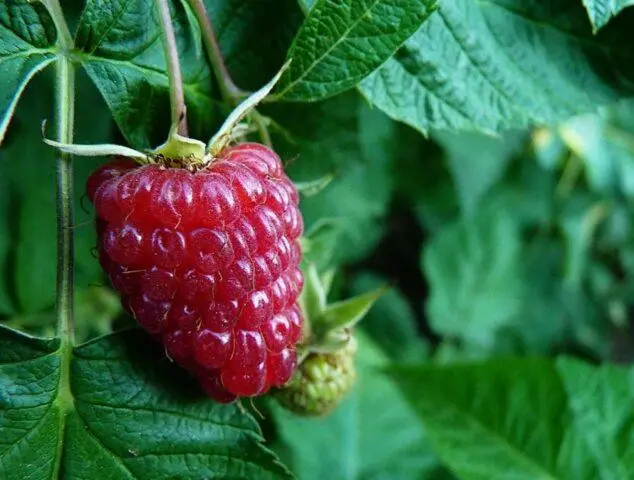
The yield of raspberries of the Brilliant variety is high – about 5 kg per bush
Bryansk wonders
A tall remontant variety up to 2 m above the ground forms up to nine fruit-bearing shoots. Brings elongated bright red berries up to 11 g by weight with a sour-sweet taste. Well suited for the Urals, not afraid of severe winter frosts. It starts fruiting from mid-August and continues until the first snow.
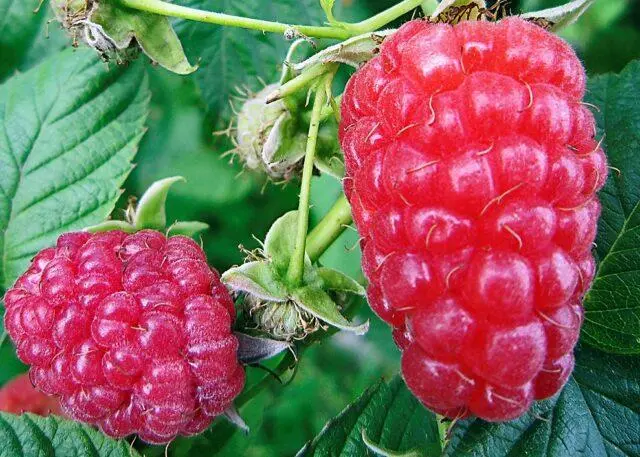
For raspberry Bryansk Divo, the formation of berries along the entire length of the shoots from the base to the top is characteristic.
Conclusion
The best varieties of remontant raspberries for the Urals are characterized by increased cold resistance. It is recommended to choose varieties with early fruiting, which completely stops until mid-autumn.









